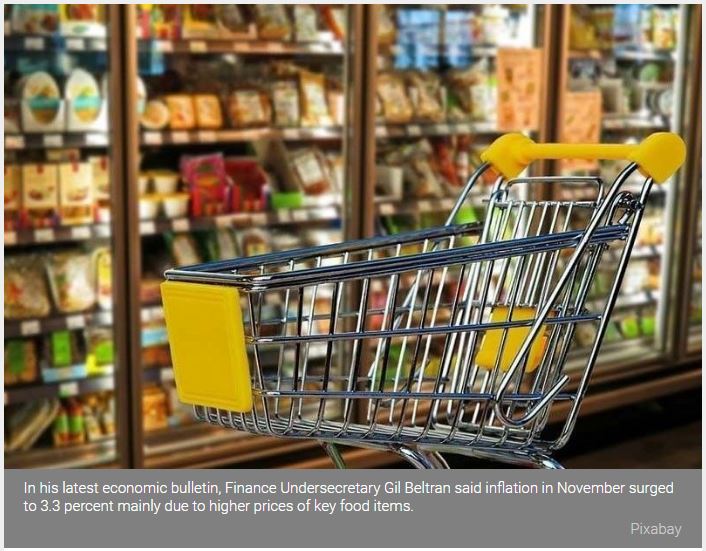Philippines: Better food delivery to stabilize prices
MANILA, Philippines — The government needs to help smoothen the movement of food items to help normalize prices following a spike in November that was caused by the series of typhoons that hit the country, according to the Department of Finance (DOF).
In his latest economic bulletin, Finance Undersecretary Gil Beltran said inflation in November surged to 3.3 percent mainly due to higher prices of key food items.
The November inflation rate was higher than the 2.5 percent recorded in October and 1.3 percent in the same month last year. It also brought the year-to-date average inflation at 2.6 percent.
Still, Beltran said, inflation is within the government’s two to four percent target.
“However, to ensure prompt price normalization, the Department of Agriculture and Department of Transportation may need to facilitate movement of food supplies from imports and food-surplus regions,” he said.
According to Beltran, the average food prices in November increased by 4.49 percent, up from the 2.13 percent growth in the previous month. This was driven by the uptick in the price of meat (8.15 percent), fish (5.32 percent) and vegetables (14.6 percent).
He also said that the spike in vegetable prices was primarily due to the series of typhoons that hit the country.
On the other hand, Beltran said non-food inflation continued to trend downward to 2.2 percent from 2.3 percent in October, driven by lower prices of electricity, gas and other fuels.
He said this, together with lower rice prices, helped dampen the impact of higher meat, fish and vegetables, as well as transport services.
Earlier, Philippine Statistics Authority (PSA) head Dennis Mapa said the agency would track the prices of vegetables, meat and fish to determine the cause of supply disruptions.
Mapa said any improvement in the prices of vegetables in the coming days would indicate that the increase in prices was caused by supply issues that were transportation-related rather than production-related.
The Bangko Sentral ng Pilipinas (BSP), meanwhile, said the spike in inflation last November was only “transitory,” with the full-year figures still seen to remain within the government’s target range.
However, the central bank said the balance of risks to the inflation outlook is still tilted toward the downside due potential disruptions to domestic and global economic activity amid the pandemic.
Following its meeting last Thursday, the Development Budget Coordination Committee (DBCC) said it now expects inflation to settle at a range of 2.4 to 2.6 percent this year. The inflation assumption for 2021 and 2022 was retained at two to four percent.
Source: https://www.philstar.com/business/2020/12/08/2062140/better-food-delivery-stabilize-prices


 English
English




